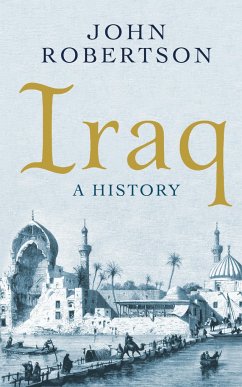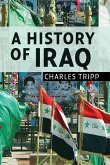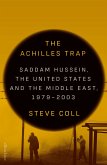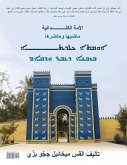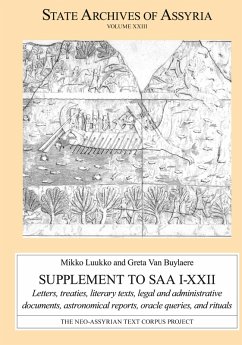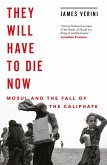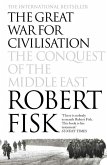- Broschiertes Buch
- Merkliste
- Auf die Merkliste
- Bewerten Bewerten
- Teilen
- Produkt teilen
- Produkterinnerung
- Produkterinnerung
A unique account of Iraq â cradle of great civilizations and birthplace of the first cities
Andere Kunden interessierten sich auch für
![A History of Iraq A History of Iraq]() Charles Tripp (University of London Professor of Politics)A History of Iraq32,99 €
Charles Tripp (University of London Professor of Politics)A History of Iraq32,99 €![The Achilles Trap The Achilles Trap]() Steve CollThe Achilles Trap24,99 €
Steve CollThe Achilles Trap24,99 €![Chaldean Nation Chaldean Nation]() Michael J BazziChaldean Nation40,99 €
Michael J BazziChaldean Nation40,99 €![Supplement to SAA I-XXII Supplement to SAA I-XXII]() Mikko LuukkoSupplement to SAA I-XXII94,99 €
Mikko LuukkoSupplement to SAA I-XXII94,99 €![Supplement to SAA I-XXII Supplement to SAA I-XXII]() Mikko LuukkoSupplement to SAA I-XXII134,99 €
Mikko LuukkoSupplement to SAA I-XXII134,99 €![They Will Have to Die Now They Will Have to Die Now]() James VeriniThey Will Have to Die Now26,99 €
James VeriniThey Will Have to Die Now26,99 €![The Great War for Civilisation The Great War for Civilisation]() Robert FiskThe Great War for Civilisation17,99 €
Robert FiskThe Great War for Civilisation17,99 €-
-
-
A unique account of Iraq â cradle of great civilizations and birthplace of the first cities
Hinweis: Dieser Artikel kann nur an eine deutsche Lieferadresse ausgeliefert werden.
Hinweis: Dieser Artikel kann nur an eine deutsche Lieferadresse ausgeliefert werden.
Produktdetails
- Produktdetails
- Short Histories
- Verlag: Oneworld Publications
- Seitenzahl: 410
- Erscheinungstermin: 1. Oktober 2016
- Englisch
- Abmessung: 215mm x 135mm x 24mm
- Gewicht: 414g
- ISBN-13: 9781780749495
- ISBN-10: 178074949X
- Artikelnr.: 44500041
- Herstellerkennzeichnung
- Libri GmbH
- Europaallee 1
- 36244 Bad Hersfeld
- gpsr@libri.de
- Short Histories
- Verlag: Oneworld Publications
- Seitenzahl: 410
- Erscheinungstermin: 1. Oktober 2016
- Englisch
- Abmessung: 215mm x 135mm x 24mm
- Gewicht: 414g
- ISBN-13: 9781780749495
- ISBN-10: 178074949X
- Artikelnr.: 44500041
- Herstellerkennzeichnung
- Libri GmbH
- Europaallee 1
- 36244 Bad Hersfeld
- gpsr@libri.de
John F. Robertson is Professor of Ancient and Middle Eastern Studies at the Central Michigan University.
Foreword
Introduction: The Glory and the Curse of Iraq’s Past
1 Places, Peoples, Potentials: the Enduring Foundations of Life in Iraq
The “Land Between the Rivers”
Distribution of Raw Materials and Natural Resources
Iraq’s Accessibility and Vulnerability to External Forces
The Peoples and Social Patterns of Iraq
2 Cradle of Civilization
“History Begins at Sumer”
The First Cities and the Invention of Writing
The Early Dynastic Period (Ca. 2900–2350 BCE)
The Akkad Period (Ca. 2350–2150 BCE)
The Ur III Period (Ca. 2100–2000 BCE)
The Old Babylonian and Old Assyrian Periods (Ca. 2000–1595 BCE)
The Kassite and Middle Assyrian Periods (1595 to Ca. 1000 BCE)
Transition to Empire, Ca. 1100–900 BCE
The Great “World Empires” (Ca. 900–539 BCE): The Neo-Assyrian and
Neo-Babylonian Periods
3 Cradle of Empires
The Rediscovery of “The Might That Was Assyria”
Assyria and the Bible: Creating a Bogeyman
Assyrian Zenith
Babylon: The Curse of an Ancient Image
“The Greatness That [Really] Was Babylon”
The Long Twilight of Iraq’s Ancient Imperial Era
4 Cradle of Religions, Crucible of Conflicts
Religion in Ancient Mesopotamia/Iraq
The Achaemenid Persians and the Religion of the Wise Lord
Alexander the Great and the Coming of Hellenism
Iraq under Parthian Rule: Religious Toleration and Vitality
From Palestine to Mesopotamia: Iraq as a Cradle of World Religions
Iraq under the Sassanids: Religious Mosaic and Holy War
Jews under the Sassanids
Christians under the Sassanids
“Gnostics” and the Apostle of Light
5 Iraq, Islam, and the Golden Age of the Arab Empire
Prelude to the Coming of Islam and the Arab Conquest of Iraq
Muhammad and the Origins of the Community of Islam
The Arab Muslim Conquest of Iraq: The Early Forging of Arab (Versus
Persian) Identity
Iraq and the Early Forging of Shi‘ite (Versus Sunni) Identity
Iraq under Umayyad Rule
The Abbasid Caliphate: Iraq as the Center of Islamic Civilization
Abbasid Decline: Iraq Drifts Away from Center Stage
6 Interlude: From Cradle to Backwater
Iraq under the Buyids, Seljuks, and Mongols
The Coming of the Seljuks and Turkish Authority
The Crusades and Saladin
The Mongol Invasion and Its Aftermath
Iraq in the Era of the “Gunpowder Empires”
European Inroads
The Seeds of Iraq’s Revival
7 The Creation and Zenith of Modern Iraq
Setting the Stage
World War I and Its Aftermath: The Hashemite Monarchy, the British, and Oil
Enter Oil
The Birth of Iraqi and Arab Nationalisms
The Nationalist Response to British Domination
Arab and Iraqi Nationalism, the Cold War, the Emergence of Israel, and the
Poisoned Blessing of Oil
The Republic: Competing Nationalisms, Resistance to the West, and New
Wealth
The Continuing Development and Impact of Iraqi and Arab Nationalism under
the Republic
Iraq’s Conquest of Its Oil under the Republic
8 The Long Descent
Republican Iraq and the Cold War Powers until 1980
Saddam’s Qadissiya: The Iran–Iraq War, 1980–88
The Crisis with Kuwait
Operation Desert Storm
1991–2003: The Scourge of Sanctions
The Anglo-American Invasion of Iraq
Epilogue: “Tell Me How This Ends”
Afterword
Notes
Bibliography
Index
Introduction: The Glory and the Curse of Iraq’s Past
1 Places, Peoples, Potentials: the Enduring Foundations of Life in Iraq
The “Land Between the Rivers”
Distribution of Raw Materials and Natural Resources
Iraq’s Accessibility and Vulnerability to External Forces
The Peoples and Social Patterns of Iraq
2 Cradle of Civilization
“History Begins at Sumer”
The First Cities and the Invention of Writing
The Early Dynastic Period (Ca. 2900–2350 BCE)
The Akkad Period (Ca. 2350–2150 BCE)
The Ur III Period (Ca. 2100–2000 BCE)
The Old Babylonian and Old Assyrian Periods (Ca. 2000–1595 BCE)
The Kassite and Middle Assyrian Periods (1595 to Ca. 1000 BCE)
Transition to Empire, Ca. 1100–900 BCE
The Great “World Empires” (Ca. 900–539 BCE): The Neo-Assyrian and
Neo-Babylonian Periods
3 Cradle of Empires
The Rediscovery of “The Might That Was Assyria”
Assyria and the Bible: Creating a Bogeyman
Assyrian Zenith
Babylon: The Curse of an Ancient Image
“The Greatness That [Really] Was Babylon”
The Long Twilight of Iraq’s Ancient Imperial Era
4 Cradle of Religions, Crucible of Conflicts
Religion in Ancient Mesopotamia/Iraq
The Achaemenid Persians and the Religion of the Wise Lord
Alexander the Great and the Coming of Hellenism
Iraq under Parthian Rule: Religious Toleration and Vitality
From Palestine to Mesopotamia: Iraq as a Cradle of World Religions
Iraq under the Sassanids: Religious Mosaic and Holy War
Jews under the Sassanids
Christians under the Sassanids
“Gnostics” and the Apostle of Light
5 Iraq, Islam, and the Golden Age of the Arab Empire
Prelude to the Coming of Islam and the Arab Conquest of Iraq
Muhammad and the Origins of the Community of Islam
The Arab Muslim Conquest of Iraq: The Early Forging of Arab (Versus
Persian) Identity
Iraq and the Early Forging of Shi‘ite (Versus Sunni) Identity
Iraq under Umayyad Rule
The Abbasid Caliphate: Iraq as the Center of Islamic Civilization
Abbasid Decline: Iraq Drifts Away from Center Stage
6 Interlude: From Cradle to Backwater
Iraq under the Buyids, Seljuks, and Mongols
The Coming of the Seljuks and Turkish Authority
The Crusades and Saladin
The Mongol Invasion and Its Aftermath
Iraq in the Era of the “Gunpowder Empires”
European Inroads
The Seeds of Iraq’s Revival
7 The Creation and Zenith of Modern Iraq
Setting the Stage
World War I and Its Aftermath: The Hashemite Monarchy, the British, and Oil
Enter Oil
The Birth of Iraqi and Arab Nationalisms
The Nationalist Response to British Domination
Arab and Iraqi Nationalism, the Cold War, the Emergence of Israel, and the
Poisoned Blessing of Oil
The Republic: Competing Nationalisms, Resistance to the West, and New
Wealth
The Continuing Development and Impact of Iraqi and Arab Nationalism under
the Republic
Iraq’s Conquest of Its Oil under the Republic
8 The Long Descent
Republican Iraq and the Cold War Powers until 1980
Saddam’s Qadissiya: The Iran–Iraq War, 1980–88
The Crisis with Kuwait
Operation Desert Storm
1991–2003: The Scourge of Sanctions
The Anglo-American Invasion of Iraq
Epilogue: “Tell Me How This Ends”
Afterword
Notes
Bibliography
Index
Foreword
Introduction: The Glory and the Curse of Iraq’s Past
1 Places, Peoples, Potentials: the Enduring Foundations of Life in Iraq
The “Land Between the Rivers”
Distribution of Raw Materials and Natural Resources
Iraq’s Accessibility and Vulnerability to External Forces
The Peoples and Social Patterns of Iraq
2 Cradle of Civilization
“History Begins at Sumer”
The First Cities and the Invention of Writing
The Early Dynastic Period (Ca. 2900–2350 BCE)
The Akkad Period (Ca. 2350–2150 BCE)
The Ur III Period (Ca. 2100–2000 BCE)
The Old Babylonian and Old Assyrian Periods (Ca. 2000–1595 BCE)
The Kassite and Middle Assyrian Periods (1595 to Ca. 1000 BCE)
Transition to Empire, Ca. 1100–900 BCE
The Great “World Empires” (Ca. 900–539 BCE): The Neo-Assyrian and
Neo-Babylonian Periods
3 Cradle of Empires
The Rediscovery of “The Might That Was Assyria”
Assyria and the Bible: Creating a Bogeyman
Assyrian Zenith
Babylon: The Curse of an Ancient Image
“The Greatness That [Really] Was Babylon”
The Long Twilight of Iraq’s Ancient Imperial Era
4 Cradle of Religions, Crucible of Conflicts
Religion in Ancient Mesopotamia/Iraq
The Achaemenid Persians and the Religion of the Wise Lord
Alexander the Great and the Coming of Hellenism
Iraq under Parthian Rule: Religious Toleration and Vitality
From Palestine to Mesopotamia: Iraq as a Cradle of World Religions
Iraq under the Sassanids: Religious Mosaic and Holy War
Jews under the Sassanids
Christians under the Sassanids
“Gnostics” and the Apostle of Light
5 Iraq, Islam, and the Golden Age of the Arab Empire
Prelude to the Coming of Islam and the Arab Conquest of Iraq
Muhammad and the Origins of the Community of Islam
The Arab Muslim Conquest of Iraq: The Early Forging of Arab (Versus
Persian) Identity
Iraq and the Early Forging of Shi‘ite (Versus Sunni) Identity
Iraq under Umayyad Rule
The Abbasid Caliphate: Iraq as the Center of Islamic Civilization
Abbasid Decline: Iraq Drifts Away from Center Stage
6 Interlude: From Cradle to Backwater
Iraq under the Buyids, Seljuks, and Mongols
The Coming of the Seljuks and Turkish Authority
The Crusades and Saladin
The Mongol Invasion and Its Aftermath
Iraq in the Era of the “Gunpowder Empires”
European Inroads
The Seeds of Iraq’s Revival
7 The Creation and Zenith of Modern Iraq
Setting the Stage
World War I and Its Aftermath: The Hashemite Monarchy, the British, and Oil
Enter Oil
The Birth of Iraqi and Arab Nationalisms
The Nationalist Response to British Domination
Arab and Iraqi Nationalism, the Cold War, the Emergence of Israel, and the
Poisoned Blessing of Oil
The Republic: Competing Nationalisms, Resistance to the West, and New
Wealth
The Continuing Development and Impact of Iraqi and Arab Nationalism under
the Republic
Iraq’s Conquest of Its Oil under the Republic
8 The Long Descent
Republican Iraq and the Cold War Powers until 1980
Saddam’s Qadissiya: The Iran–Iraq War, 1980–88
The Crisis with Kuwait
Operation Desert Storm
1991–2003: The Scourge of Sanctions
The Anglo-American Invasion of Iraq
Epilogue: “Tell Me How This Ends”
Afterword
Notes
Bibliography
Index
Introduction: The Glory and the Curse of Iraq’s Past
1 Places, Peoples, Potentials: the Enduring Foundations of Life in Iraq
The “Land Between the Rivers”
Distribution of Raw Materials and Natural Resources
Iraq’s Accessibility and Vulnerability to External Forces
The Peoples and Social Patterns of Iraq
2 Cradle of Civilization
“History Begins at Sumer”
The First Cities and the Invention of Writing
The Early Dynastic Period (Ca. 2900–2350 BCE)
The Akkad Period (Ca. 2350–2150 BCE)
The Ur III Period (Ca. 2100–2000 BCE)
The Old Babylonian and Old Assyrian Periods (Ca. 2000–1595 BCE)
The Kassite and Middle Assyrian Periods (1595 to Ca. 1000 BCE)
Transition to Empire, Ca. 1100–900 BCE
The Great “World Empires” (Ca. 900–539 BCE): The Neo-Assyrian and
Neo-Babylonian Periods
3 Cradle of Empires
The Rediscovery of “The Might That Was Assyria”
Assyria and the Bible: Creating a Bogeyman
Assyrian Zenith
Babylon: The Curse of an Ancient Image
“The Greatness That [Really] Was Babylon”
The Long Twilight of Iraq’s Ancient Imperial Era
4 Cradle of Religions, Crucible of Conflicts
Religion in Ancient Mesopotamia/Iraq
The Achaemenid Persians and the Religion of the Wise Lord
Alexander the Great and the Coming of Hellenism
Iraq under Parthian Rule: Religious Toleration and Vitality
From Palestine to Mesopotamia: Iraq as a Cradle of World Religions
Iraq under the Sassanids: Religious Mosaic and Holy War
Jews under the Sassanids
Christians under the Sassanids
“Gnostics” and the Apostle of Light
5 Iraq, Islam, and the Golden Age of the Arab Empire
Prelude to the Coming of Islam and the Arab Conquest of Iraq
Muhammad and the Origins of the Community of Islam
The Arab Muslim Conquest of Iraq: The Early Forging of Arab (Versus
Persian) Identity
Iraq and the Early Forging of Shi‘ite (Versus Sunni) Identity
Iraq under Umayyad Rule
The Abbasid Caliphate: Iraq as the Center of Islamic Civilization
Abbasid Decline: Iraq Drifts Away from Center Stage
6 Interlude: From Cradle to Backwater
Iraq under the Buyids, Seljuks, and Mongols
The Coming of the Seljuks and Turkish Authority
The Crusades and Saladin
The Mongol Invasion and Its Aftermath
Iraq in the Era of the “Gunpowder Empires”
European Inroads
The Seeds of Iraq’s Revival
7 The Creation and Zenith of Modern Iraq
Setting the Stage
World War I and Its Aftermath: The Hashemite Monarchy, the British, and Oil
Enter Oil
The Birth of Iraqi and Arab Nationalisms
The Nationalist Response to British Domination
Arab and Iraqi Nationalism, the Cold War, the Emergence of Israel, and the
Poisoned Blessing of Oil
The Republic: Competing Nationalisms, Resistance to the West, and New
Wealth
The Continuing Development and Impact of Iraqi and Arab Nationalism under
the Republic
Iraq’s Conquest of Its Oil under the Republic
8 The Long Descent
Republican Iraq and the Cold War Powers until 1980
Saddam’s Qadissiya: The Iran–Iraq War, 1980–88
The Crisis with Kuwait
Operation Desert Storm
1991–2003: The Scourge of Sanctions
The Anglo-American Invasion of Iraq
Epilogue: “Tell Me How This Ends”
Afterword
Notes
Bibliography
Index

